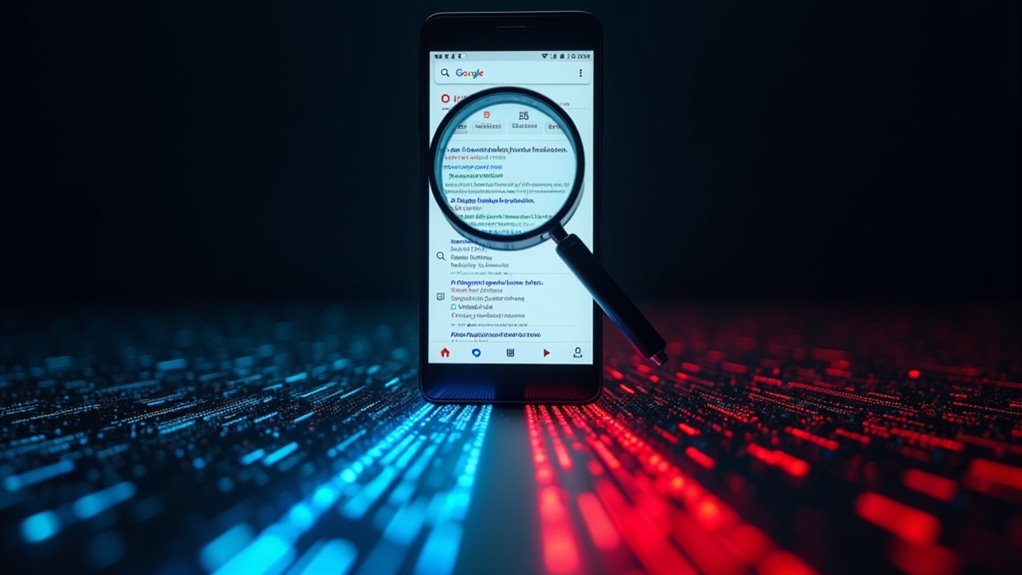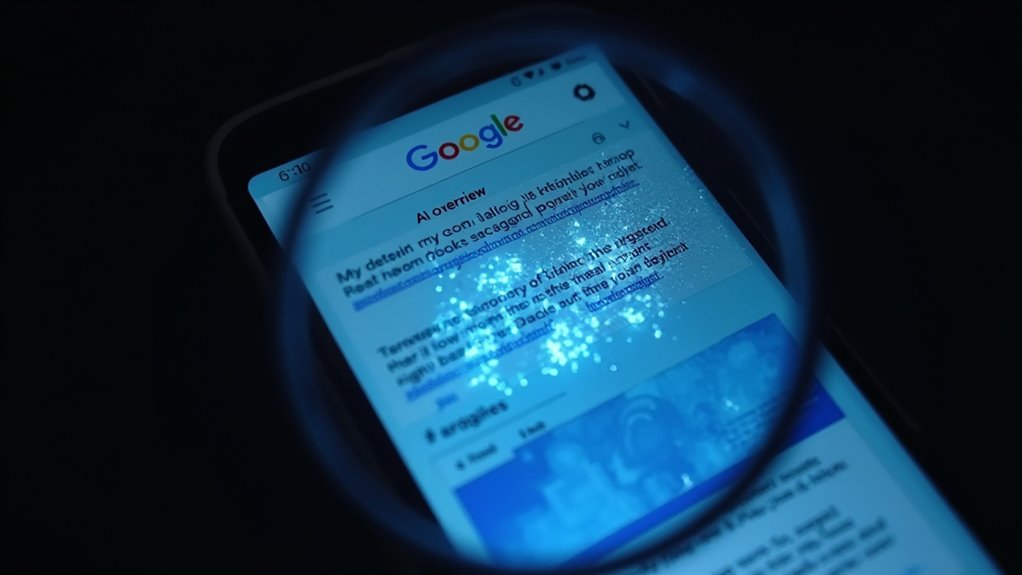Google’s AI responses blend convenience with controversy. Their Gemini model delivers instant answers but occasionally “hallucinates” false information—remember that caramel-for-eggs fiasco? While Google implements technical fixes, AI overviews push traditional search results downward, affecting website traffic and raising information control concerns. Users appreciate quick answers but question overall search quality, prompting many to seek alternative platforms. Brands must adapt with high-quality content to maintain visibility. Discover how this technology shapes your daily information access below.

Countless search engine users are noticing a dramatic shift in how Google delivers information these days. The tech giant has integrated its Gemini large language model into search results, creating what they call “AI Overviews” – generated summaries that aim to answer queries directly on the results page. These responses analyze full context rather than just keywords, understanding follow-up questions without requiring users to restate their entire query. The experimental AI mode, powered by Gemini 2.0, provides enhanced capabilities for handling complex queries including coding and advanced math problems.
Despite impressive capabilities, Google’s AI has significant limitations worth noting. The technology occasionally “hallucinates,” generating false information through its predictive nature. Remember that time it confidently recommended caramel as a substitute for eggs in recipes? Google recently implemented over a dozen technical improvements to address the erroneous information generated by search summaries. User trust has become a central concern as these systems can misinterpret queries or manipulate language nuances in ways that spread misinformation. Google claims to be updating their systems regularly, but examples of historical inaccuracies and misleading health advice continue to emerge.
AI’s impressive facade masks troubling tendencies to invent facts and spread dangerous misinformation despite ongoing updates.
The introduction of AI responses has dramatically altered the search landscape. Traditional organic results now get pushed lower (or sometimes vanish entirely), resulting in decreased website traffic across the board. This development has SEO professionals scrambling to adapt their strategies. Google has fundamentally positioned itself as the primary arbiter of relevant information – a power shift that raises serious questions about information control. Much like in marketing, these AI systems leverage predictive analytics to anticipate user needs and deliver personalized results.
Consumer reactions remain decidedly mixed. Many appreciate the convenience of quick, direct answers without clicking through multiple sites. Others perceive a decline in overall search quality and increasingly turn to alternative platforms or community feedback for reliable information. The multimodal capabilities integrating text, images, and voice create a more intuitive experience, yet many users remain skeptical.
For brands and marketers, this evolution demands adaptation. Visibility concerns are legitimate as click-through rates decline. The most successful strategies now focus on creating high-quality, contextually relevant content that the AI systems can reference. As this technology continues evolving, both users and content creators must navigate a landscape where Google’s AI increasingly mediates our information ecosystem.
Frequently Asked Questions
How Does Google AI Compare to Other Large Language Models?
Google’s AI models stack up impressively against other LLMs when examining performance metrics.
Like GPT models, they excel in language capabilities but differentiate through multimodal features. Gemini processes text, images, and video simultaneously, while some competitors remain text-focused. Their integration with other Google services gives them practical advantages.
However, all LLMs share similar limitations around accuracy and context understanding. The real difference? How they’re implemented and what specific tasks they’re optimized for.
What Biases Exist in Google Ai’s Training Data?
Google AI’s training data contains several bias sources including cultural biases that reflect dominant Western perspectives.
Gender stereotypes persist in how professions are portrayed, while racial representation remains imbalanced across different contexts.
The system struggles with algorithmic fairness because its training captures societal inequities.
Like all LLMs, it mirrors the prejudices embedded in its source materials.
Developers are working to identify and mitigate these issues, but complete elimination of bias remains a significant challenge.
Can Google Ai’s Responses Be Verified for Accuracy?
Yes, Google AI’s responses can be verified for accuracy using several tools. The “double-check responses” button is your best friend—it searches for similar content online to confirm facts.
Response accuracy varies, but statements get categorized as highlighted (confirmed), non-highlighted (unverified), or unhighlighted (limited info). Google Search integration provides another fact verification layer.
How Does Google Protect User Privacy When Using AI?
Google protects user privacy in AI through multiple safeguards.
Data encryption keeps information secure while interacting with AI tools. User consent is required before any data is used for AI training, giving people control over their information.
Enterprise-grade security extends automatically to AI interactions, and organizations can enable client-side encryption for extra protection.
Information Rights Management policies further restrict AI access to sensitive content. Users can also disable data caching for zero retention of their queries.
Will Google AI Replace Human Jobs in Content Creation?
Google AI will likely transform content creation rather than completely replace it. The AI Job Impact varies across sectors, with routine content most vulnerable to automation.
However, Content Quality remains paramount – Google still prioritizes expertise and trustworthiness regardless of who (or what) created it.
Human creators will need to adapt, focusing on uniquely human skills like storytelling and nuanced perspectives while leveraging AI as a collaborative tool rather than viewing it as competition.









